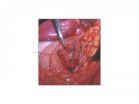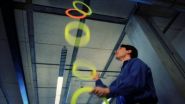(Press-News.org) A child's illness can challenge a parent's wellbeing. However, a study recently published in the journal Biology of Blood and Marrow Transplantation shows that in the case of a child's stem cell transplant, parents feel increased distress at the time of the procedure, but eventually recover to normal levels of adjustment.
"Across all study groups, what we basically showed is that parents are resilient. Overall, parents get better over time," says Jennifer Lindwall, PhD, assistant professor of psychiatry at the CU School of Medicine, teaching partner of the University of Colorado Cancer Center.
The study measured psychological distress and positive affect in 171 parent/child pairs from time of admission for a child's stem cell transplant until 6 weeks after the procedure, and also measured depression, posttraumatic stress and benefit-finding at the time of admission for the procedure and at 24 weeks after. Results in pediatric patients were previously reported in the journal Pediatrics. The current study reports the results in parents.
"The aim of the study was to examine an intervention to promote positive adjustment of patients and their parents. In one group, children were given humor and massage therapy, in a second group parents were given relaxation/imagery training and massage therapy in addition to the child intervention, and a third group did not receive any additional intervention beyond standard care provided at the hospital," Lindwall says.
Though no significant differences were found across treatment groups, Lindwall and colleagues from St. Jude Children's Research Hospital showed a consistent finding: "In many respects, a parent's distress parallels the child's distress. As things get better for the child, they get better for the parent as well. We saw this with distress in the acute period after transplant and also in global measures of depression, PTSD and benefit-finding," Lindwall says. Parents demonstrated remarkable recovery despite facing a significant life challenge.
Lindwall points out that the medical model in some hospital settings views patients and parents from a deficit perspective – it seeks to right what is wrong. However, Lindwall and colleagues also see value in exploring the factors that create resilience in parents – to understand what has gone right in these cases despite facing significant challenges.
"While the study showed the norm is resilience and recovery, there are certainly some parents of children with significant medical illness who don't do well – parents who remain distressed. Our challenge now is to predict which parents are at the highest risk for difficulties and to design interventions that can help these parents cope during their child's medical challenges," Lindwall says.
INFORMATION: END
Study: Resilience in parents of children undergoing stem cell transplant
2014-02-11
ELSE PRESS RELEASES FROM THIS DATE:
Data on today's youth reveal childhood clues for later risk of STDs
2014-02-11
Here's yet another reason to focus on kids' early years. Children who grow up in well-managed households, enjoy school, and have friends who stay out of trouble report fewer sexually transmitted diseases in young adulthood, according to a new analysis.
The findings, from University of Washington longitudinal surveys of nearly 2,000 participants, suggest that efforts to curb the spread of sexually transmitted diseases should begin years before most people start having sex.
"Pay less attention to the sex aspect of this and think of the larger context," is lead author ...
Targeting tumors: Ion beam accelerators take aim at cancer
2014-02-11
EVENT: Advances in the design and operation of particle accelerators built for basic physics research are leading to the rapid evolution of machines that deliver cancer-killing beams. Hear about the latest developments and challenges in this field from a physicist, a radiobiologist, and a clinical oncologist, and participate in a discussion about cost, access, and ethics at a symposium organized by the U.S. Department of Energy's Brookhaven National Laboratory ("Targeting Tumors: Ion Beam Accelerators Take Aim at Cancer") and at a related press briefing--both to be held ...
Nanoparticles treat muscular dystrophy in mice
2014-02-11
Researchers at Washington University School of Medicine in St. Louis have demonstrated a new approach to treating muscular dystrophy. Mice with a form of this muscle-weakening disease showed improved strength and heart function when treated with nanoparticles loaded with rapamycin, an immunosuppressive drug recently found to improve recycling of cellular waste.
The study appears online in The FASEB Journal.
The investigators, including first author Kristin P. Bibee, MD, PhD, looked at a mouse model of Duchenne muscular dystrophy, the most severe inherited form of the ...
Child abuse rises with income inequality, study shows
2014-02-11
ITHACA, N.Y. – As the Great Recession deepened and income inequality became more pronounced, county-by-county rates of child maltreatment – from sexual, physical and emotional abuse to traumatic brain injuries and death – worsened, according to a nationwide study by Cornell University.
The income inequality-child maltreatment study, to be published in the March 2014 edition of the peer-review journal Pediatrics, covers all 3,142 American counties from 2005-09, and is one of the most comprehensive of its kind and the first to target child abuse in places with the greatest ...
I smoke, but I'm not a smoker
2014-02-11
While smoking among California adults has dramatically declined in recent decades, researchers at the University of California, San Diego School of Medicine report there is a surprisingly large number of people who say they use cigarettes, but don't consider themselves to be "smokers."
Writing in the February 5 online issue of Tobacco Control, Wael K. Al-Delaimy, MD, PhD, professor and chief of the Division of Global Health in the UC San Diego Department of Family and Preventive Medicine, and colleagues estimate that, in 2011, almost 396,000 Californians (12.3 percent ...
Dartmouth study provides first global evidence that foreign aid boosts public opinion
2014-02-11
A study by Dartmouth and Australian researchers provides the first empirical evidence using data from a variety of countries that foreign aid can greatly improve foreign public opinion of donor countries.
The findings are based on a U.S. foreign aid program targeting HIV and AIDS -- the President's Emergency Plan for AIDS Relief (PEPFAR) -- that has substantially improved public perception of the United States in the more than 80 developing countries receiving the aid. But the findings have broader policy implications for an emerging international order in which major ...
Game changer: Biomarker identified for noncancerous pancreatic cysts
2014-02-11
INDIANAPOLIS -- Researchers at the Indiana University School of Medicine have discovered a highly accurate, noninvasive test to identify benign pancreatic cysts, which could spare patients years of nerve-racking trips to the doctor or potentially dangerous surgery.
The findings are reported in "Vascular Endothelial Growth Factor, a Novel and Highly Accurate Pancreatic Fluid Biomarker for Serous Pancreatic Cysts" online in the Journal of the American College of Surgeons.
The test, which analyzes fluid from pancreatic cysts, can identify a common type of benign cyst that ...
New target isolated for leukemia drug development
2014-02-11
SAN ANTONIO (February 11, 2014) – There are potentially effective treatments for acute myeloid leukemia (AML), but they only work in 20 to 40 percent of cases. In a paper published today in Leukemia, a Nature journal, a UT Health Science Center researcher has pinpointed a protein that could play a key, previously unknown role in the development of pediatric AML — promising new information in the quest to treat and cure childhood leukemias.
AML starts at the point when cells mature into different kinds of blood cells. In AML, the cancerous cells grow and proliferate in ...
No clowning around: Juggling sheds light on how we run
2014-02-11
Juggling may seem like mere entertainment, but a study led by Johns Hopkins engineers used this circus skill to gather critical clues about how vision and the sense of touch help control the way humans and animals move their limbs in a repetitive way, such as in running. The findings eventually may aid in the treatment of people with neurological diseases and could lead to prosthetic limbs and robots that move more efficiently.
The study was published online recently by the Journal of Neurophysiology and will be the cover article in the journal's March 2014 print edition.
In ...
EU rules are denying children latest cancer drugs
2014-02-11
Children with cancer are being denied new, potentially life-saving drugs, because EU rules are allowing companies to trial some drugs only in adults, leading cancer experts warn today.
Changes to how EU rules are implemented could allow children access to a goldmine of potential cancer drugs which have currently only been tested in adults – by making it more difficult for pharma companies to avoid testing them in under-18s too.
Under the current system, pharma companies often gain exemptions from carrying out expensive testing of cancer drugs in patients under the age ...



